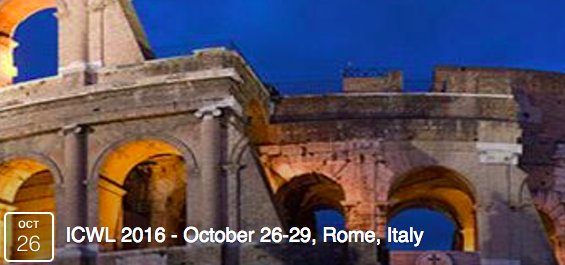
The 15th International Conference on Web-based Learning (ICWL 2016) held recently (October 26-29) in Rome, Italy, has been recognized as well-known international scientific event that gathers together experts, educators and researchers from all over the world to present and discuss existing practice and future solutions for web-based learning.
This year the ICWL 2016 conference was organized in conjunction with the 1st International Symposium on Emerging Technologies for Education and several other hosted workshops that strengthened the notability and significance of this scientific forum for e-education.
The Technical University of Sofia (TUS) educates future professionals in several engineering areas implementing modern technology solutions. TUS is involved in the TeSLA project as a unique partner delivering engineering education and as a university with dominating blended learning mode. The education at TUS combines standard offline and online forms for teaching, learning and assessment. The assessment in engineering education appears to be an important factor for: improving the motivation for learning; driving the continuous receiving of knowledge; stimulating creativity and the ability for problem solving and instigating curiosity. The TUS team involved in TeSLA presented at the ICWL conference an investigation on TeSLA supported e-assessment model for engineering education in blended learning environment.
The forum provided a good opportunity to disseminate TeSLA objectives and make the audience aware of possible implementation scenarios. The model and framework for assessment, presented at this forum involved typical e-assessment scenarios for the engineering education. It differentiates two assessment components, related to the offline and online assessment forms. High quality of the engineering education is achieved by a combination of online management of learning and practice in laboratories with specialized equipment. The proper balance of the offline and online assessment components has to be established according to the specificity of the curriculum of each teaching course. The TeSLA system that will be developed within the project provides the support to the online assessment component. Why TeSLA? Because TeSLA:
The presented model with e-assessment scenarios at the ICWL conference proves that the adoption of TeSLA identification, security and authorship recognition technologies will enhance the quality of engineering education at TUS, will facilitate the stakeholders involved in the educational process and further involvement of online approaches in the assessment practice.
TUS University
FUNDED BY THE EUROPEAN UNION
TeSLA is not responsible for any contents linked or referred to from these pages. It does not associate or identify itself with the content of third parties to which it refers via a link. Furthermore TESLA is not liable for any postings or messages published by users of discussion boards, guest books or mailing lists provided on its page. We have no control over the nature, content and availability of any links that may appear on our site. The inclusion of any links does not necessarily imply a recommendation or endorse the views expressed within them.
TeSLA is coordinated by Universitat Oberta de Catalunya (UOC) and funded by the European Commission’s Horizon 2020 ICT Programme. This website reflects the views only of the authors, and the Commission cannot be held responsible for any use which may be made of the information contained therein.